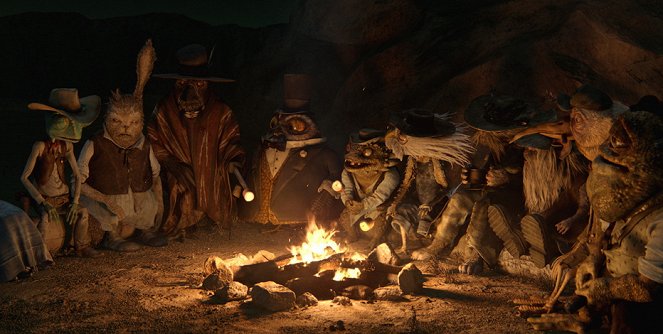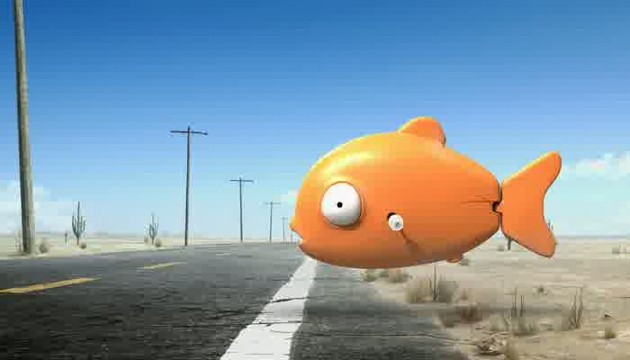Rendező:
Gore VerbinskiZeneszerző:
Hans ZimmerSzereplők:
Johnny Depp, Isla Fisher, Abigail Breslin, Ned Beatty, Alfred Molina, Bill Nighy, Stephen Root, Harry Dean Stanton, Timothy Olyphant, Ray Winstone (több)Streaming (2)
Tartalmak(1)
Rango, a kaméleon egész életét egy terráriumban élte. Az unalmas egyhangúságnak azonban egy csapásra vége, amikor a család kedvencét véletlenül elveszítik a Mojave-sivatagban. A vándorútra kényszerült Rango útja hamarosan egy szó szerint poros vadnyugati városkába vezet, lévén Pornak nevezik a törvényen kívüli, fura lényekkel benépesült helyet. A kaméleon hiába veti latba kiváló alkalmazkodó-képességét, ha életben akar maradni, ennél többre van szüksége. Önhibáján kívül a városka seriffje lesz, mindenki benne látja a megmentőt, akire vártak. (UIP-Duna Film)
(több)Videók (11)
Recenziók (14)
A Rango inkább epizodikus finom falatokról szól, mint egy teljes történetről. De ezek a finom falatok rengeteg ötletet rejtenek, és a híres western filmek, Rodriguez-filmek és végül a Ponyvaregény előtt is hatalmas tiszteletet tesznek. A szőrös gyíkszerű, köpködő hombres figurák, melyek grafikailag részletesebbek és élethűbbek, mint Clu a Tron filmben, a műfaj kedvelői számára igazi csemege. Zimmer post-sherlockos kompozíciója megszakítja a komikus betéteket, és lendületet ad az akciójeleneteknek, amelyek jobban vannak "felvéve és összevágva", mint bármi, amit a legjobb akciófilmekben láttál. És vigyázat, a felnőtt humor kadenciája messze meghaladja a gyerek humort.
()
The film features excellent individual elements that stand out on their own (Clint), underlined by spectacular visuals (Deakins), playful music, and a horde of allusions, quotes, and parodies. Unfortunately, the result of the aforementioned is a rather incoherent patchwork, whose issue is not so much that it dabbles in multiple genres, but rather that it lacks the real wit that might have brought (paradoxically!) a bit of childishness in Verbinski's writing, the absence of which, on the other hand, I can quite understand after the Pirates trilogy.
()
For the passage where this was a not holds barred spaghetti western that in each camera angle and every tone nods to its roots, Verbinski can dig Leone up from his grave and shake him be the hand as equals. The only snag is that this constantly oscillates between surrealist animated adventure for adults, packed full of references to movies that are rarely nodded at (kicking off right at the beginning with Fear and Loathing in Las Vegas, for instance), through ingenious, slapstick inspired situations in Pirates of the Caribbean style, to spaghetti western. And all of these passages separately are gems, but they don’t work together, getting in the way of each other, because each of these approaches alone are enough make (and deserve) a feature length movie of their own. So on one hand it resuscitates several dying genres (not just western or surrealist, but also intelligent, non-ridiculing parodies or pastiches and CGI animation works as such), on the other it rather wastes the potential. And you must watch it in the English language version, not so much for Depp as for Nighy and Olyphant, and the Czech subtitles are playful and inventive (although very loose) for a change OST score: 5/5
()
Typical Verbinski. The ideas are pressurized to burst, in a matter of minutes it's able to pulverize Leone, Coppola and Bay together, and it just burps lightly. It's much more functional as a Western ensemble than as a film. The scattering of the individual parts is even surreally generous, so the resulting impression is somewhat restless. With the addition of Czech dubbing, I will have to take away the fifth star, which does not change the fact that it is probably the animated highlight of the season.
()
After Wes Anderson did it, another live-action film director whom at first glance one wouldn’t expect to take such a step entered the field of animation and showed us how tedious all of those industrial animated movies from DreamWorks, Pixar and other specialised studios really are. On the other hand, as a creator of films with a strong presence of computer-generated effects, characters and even entire sequences, Verbinski’s work actually has something in common with animation, and his original project, in which after a long time he doesn’t have Disney’s Agent Smith breathing down his neck, but is rather nudged by the creative maniacs from Nickelodeon Movies, will allow viewers to see the extent of his creative distinctiveness. What Rango has in common with the Fantastic Mr. Fox is overarching exaggeration and self-reflection of genre formulas, as well as visual stylisation that shuns the simple shapes and multifarious colours that are typical of the competition. Specifically, though we have computer animation here, the stylisation leans towards a coarse hyper-realism with an abundance of the grotesque and deranged carnivalesque details of Verbinski’s Pirates of the Caribbean movies. Most of the characters have their own distinct personalities, which are incorporated into the smallest details of their movements, while on a general level the design of the Wild West animal characters looks more like a collection of discarded exhibits from a school biology classroom than vibrant photos in the style of National Geographic (see, for example, Legend of the Guardians: The Owls of Ga’Hoole). In addition to the visuals, however, Rango has an unexpected ace up its sleeve in the form of an overarching meta-genre self-reflection that makes the film a spectacle that parents are more likely to make their kids go to see rather than being forced to do so by their kids. With its dialogue working on multiple levels and relating to the nature of heroism, the role of particular narrative tropes and the heroes’ bond with their stories, it is a caustic reflection on how animated films are, paradoxically and essentially against their intrinsic nature, constrained by their aspiration to be like live-action films, or rather how they are hindered by the fact that audiences now automatically expect them to resemble live-action films. The fact that intellectual mischief dressed up as a dusty and rough-around-the-edges western won the Oscar for best animated film is actually the fulfilment of another formula – the outsider reaches a happy ending and is accepted into mainstream society.
()
Galéria (70)
Photo © Paramount Pictures Germany



Hirdetés